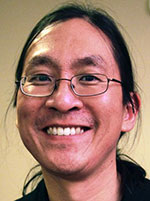College of Humanities Newsletter
Spring 2012, Volume 6, Issue 2
In This Issue
- Message from Humanities Dean Elizabeth A. Say
- College of Humanities Awarded $100,000 Startalk Grant
- Not quite the PROUST QUESTIONNAIRE...Part One
- Not quite the PROUST QUESTIONNAIRE...Part Two
- Not quite the PROUST QUESTIONNAIRE...Part Three
- Not quite the PROUST QUESTIONNAIRE...Part Four
- Meet our new Director of Development, June Penrod
- The Linda Nichols Joseph English Reading Room and Merit Scholarships
- Mission
Departments and Programs
- Asian American Studies
- Chicana/o Studies
- English
- Gender & Women’s Studies
- Liberal Studies & Humanities Interdisciplinary Program
- Modern & Classical Languages & Literatures
- Philosophy
- Religious Studies
- Office of Interdisciplinary Studies:
- American Indian Studies
- Central American Studies
- Jewish Studies
- Linguistics
- Queer Studies
- Russian Studies
- Sustainability Studies
Not quite the PROUST QUESTIONNAIRE . . .
Part Two
Clement Lai, Assistant Professor
Asian American Studies

Clement Lai
Clement Lai was recently selected as the College of Humanities’ 2012/13 University Research Fellow. During his fellowship semester in fall 2012, Lai will complete revisions on his book Between Blight and a New World: Urban Renewal and the Multiracial Neighborhood, for which he conducted 45 oral histories to examine and give voice to differing outcomes for neighboring Japanese Americans and African Americans in San Francisco’s Fillmore District following post–World War II redevelopment.
What is your idea of perfect happiness?
Driving across the country (I’ve done it five times) with my wife, Kelly, and our dog, Mochi. The stereo is playing a punk song, probably the Clash, and there’s several hundreds of miles of road still ahead of us. Bright, clear skies. We’ve just shared a joke or maybe I’m trying to sing the lyrics (off-key and out-of-tune, of course), and I couldn’t be happier.
With which historical figure do you most identify?
Richard Aoki was born in San Leandro, Calif., in 1938 and was interned in the Topaz Internment Camp during World War II. After camp he grew up in a multiracial, working-class Oakland neighborhood and later served in the U.S. Army. These experiences politicized him and he later cofounded the first Black Panther Party chapter with Bobby Seale and Huey Newton. He also played a key role in the Third World Strike to found ethnic studies at UC Berkeley. I met him years later at UC Berkeley as a graduate student. He was courageous, inspiring, and funny. A great organizer and storyteller. A comrade. The only person who I’ve met who greeted you with a power salute. He passed in March 2009. I miss him deeply.
Which living person do you most admire?
Ruthie Gilmore. She’s a founding member of Critical Resistance, one of my advisors, and currently a professor at CUNY. The definition of scholar and activist. Great sense of irony, too.
What is your greatest extravagance?
I like and collect handmade electric and acoustic guitars. There’s something magical about being able to talk with a luthier about building an instrument. You talk about what styles of music you like, what aspects and characteristics of guitars you like (e.g., neck width, depth, and shape/profile), and what kinds of tones you’re looking for in the combination of woods for fretboard, neck, top wood, and body wood. I’d like more guitars than I could ever afford, but at least I have fun dreaming.
When and where were you happiest?
July 29, 2007. My wedding day. No kidding.
What do you consider your greatest achievement?
On a professional level, honestly being an effective mentor and teacher who’s made an impact on students’ lives and gotten them to think that they can change the world—collectively, slowly, but assuredly. On a personal level, being a good son to my parents and housebreaking my dog (that was herculean). On the level of mayhem, founding and playing in an Asian American anarcho, reggae, country, ska, funk, punk band.
If you were to die and come back as a person or thing, what do you think it would be?
I’d come back as Joe Strummer on my musically inclined nights. He could rock.
What is it that you most dislike?
Avarice and hubris.
Which talent would you most like to have?
I wish that I were funnier, because my sense of irony is only above average. Actually, my wife says that I should be a better cook, and frankly I wish that I were more artistically inclined.
Martha Escobar, Assistant Professor
Chicana and Chicano Studies
Martha D. Escobar obtained her Ph.D. from the Department of Ethnic Studies at the University of California, San Diego and is currently an assistant professor in the Department of Chicana/o Studies at California State University, Northridge. She is a member of Critical Resistance and California Coalition for Women Prisoners, grassroots organizations dedicated to dismantling the U.S. prison regime. Her interests center on the racialized and gendered connections between prisons and immigration control. By making these connections she attempts develop conversations between the prison abolition movement and the immigrant rights movement.
Francisco Tamayo, Assistant Professor
Chicana and Chicano Studies
Dr. Tamayo earned his Ph.D. in rhetoric and composition at Washington State University. His primary areas of expertise include teaching English as a Second Language, developmental English, and comparative ethnic studies.
What is your idea of perfect happiness?
The equal distribution of power at all levels of society.
What is your greatest fear?
Losing my humbleness.
Which living person do you most admire?
People who fight against racism, classism, sexism, and homophobia.
When and where were you happiest?
Once there is an equal distribution of power at all levels of society.
What do you consider your greatest achievement?
Being a father.
